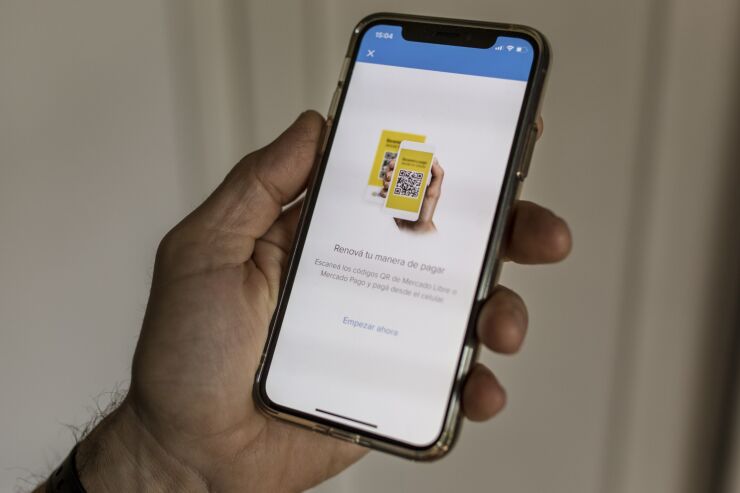To get a better handle on the coronavirus-driven boom in Latin American e-commerce, cross-border processors are ramping up digital alternatives for shoppers who pay cash for online purchases.
The goal is to mitigate the enforced closure of cash pay-in locations and ensure e-commerce merchants don’t lose out on sales to cash-preferred customers.
Because of the large number of unbanked Latin American consumers and concerns about online security, the use of cash for online shopping is well established in the region. Consumers unable or unwilling to use cards, digital wallets or bank transfers can make online purchases with bar-coded paper vouchers that they print and take to cash pay-in locations such as convenience stores, lottery agents and bank branches. Cash pay-in networks include Brazil’s Boleto Bancário (banking ticket), Chile’s ServiPag, Mexico’s Oxxo, Peru’s PagoEfectivo, and Argentina’s RapiPago and PagoFacil.
During the pandemic, many cash pay-in locations used by these networks are closed. Argentina’s lockdown includes most of the stores accepting RapiPago and PagoFacil, and shutdowns in Brazil and Mexico are affecting Boleto and Oxxo payments, respectively. Additionally, consumers may be reluctant to handle cash or even visit the pay-in locations that are open.
As overall online purchase volumes surge during lockdown, the drive is on to digitize cash-preferred consumers. Market research firm

Latin Americans typically buy from foreign e-commerce merchants, which use cross-border processors such as dLocal, Ebanx, PagBrasil and Rapyd to provide shoppers with local payment options, including cash. According to eMarketer, 23.1 million Brazilians made cross-border purchases in 2018.
Cross-border processors are working with e-commerce merchants to encourage the use of methods such as digital wallets, prepaid cards, and bank account transfers, so they don’t lose out on the potential purchasing power of unbanked and cash-preferred customers. In Brazil alone, there are 45 million unbanked adults and
“Around 70% of Boleto Bancário users have bank accounts,” said Erika Daguani, Ebanx’s B2B product director. “Although Boleto purchases can be paid via digital banking, many banked consumers prefer to pay cash with Boleto for fear of using their cards online.”
dLocal is focusing heavily on cash replacement and facilitating different digital payment options. “We’re using our on-the-ground knowledge in Latin America to adjust payment flows for merchants to help mitigate losses from cash transactions,” said Rodrigo Sánchez Prandi, dLocal’s VP of product.
In Chile, dLocal is working with ServiPag, a cash pay-in network used by the 40% of Chileans who prefer not to use credit cards online.
“Unlike other Latin American countries, Chile is highly bancarized, so the majority of people paying cash online have bank cards,” said Sánchez Prandi. “The challenge is to encourage them to use their cards and bank accounts to make online payments. dLocal has been conducting pilots with ServiPag to show consumers the flexibility of using credit cards or e-wallets instead of cash payments.”
In countries with low bancarization levels such as Argentina, Brazil, and Mexico, dLocal is pushing online solutions to encourage unbanked consumers to pay digitally. “These include e-wallets linked to prepaid cards, which can be funded from cash deposits,” said Sánchez Prandi.
Argentinian e-wallets from Ualá and
In the month after Argentina’s lockdown started, Ualá provided unbanked consumers with almost 140,000 prepaid cards linked to its
An option dLocal is promoting with its bank partners in Brazil and Mexico is digital buy-now-pay-later installment loans for consumers lacking credit cards. These loans can be repaid via e-wallets, bank transfers, or cash.
Installment loans on credit cards are very common in
“Offering installment loans is an incentive for customers to pay digitally, and typically people buying with installment loans online spend more per purchase,” said Sánchez Prandi. “So we’re piloting installment loans for online shoppers who don’t have credit cards.”
Piloting and communicating with consumers and merchants about digital options have paid off for dLocal, leading to a 15-20% increase in digital transaction approvals in Argentina alone. “COVID-19 is reshaping payment ecosystems in Latin America,” Sánchez Prandi said. “We’re seeing the shift to digital starting to happen and, hopefully, it will remain after the crisis.”
Brazil-based
In January, Ebanx launched its own digital wallet in Brazil, Ebanx Go, which includes a physical and a virtual prepaid Visa card. In April, Ebanx launched an interface for Shopify-based merchants selling to Brazil which lets consumers use local payment methods via a checkout on a merchant’s own site, instead of redirecting them to pay on Ebanx’s platform, which its previous Shopify integration required. According to Daguani, merchants testing the new Shopify interface saw a 30 percentage point decrease in checkout abandonment rates and a 7 percentage point increase in conversions.
Ralf Germer, CEO of Brazil-based PagBrasil, said his company had been focusing on enhancing the online payment experience for merchants and customers long before COVID-19.
“We developed Boleto Flash, as Boleto Bancário doesn’t work well on smartphone screens,” he said. “Boleto Flash lets consumers copy and paste Boleto barcodes into their digital banking app or e-wallet to complete a payment on their phone. This encourages cash-preferred customers to make digital payments.”
London-based Rapyd is diversifying cash pay-in locations. “Cross-border processors that work with multiple local cash pay-in networks are in a stronger position than processors that offer only one cash payment method such as Boleto,” said Eric Rosenthal, Rapyd’s general manager for the Americas. “We support three other cash networks apart from Boleto in Brazil. So, when people can’t use Boleto due to stores being closed, we can fall back on other cash networks whose locations are open.”





